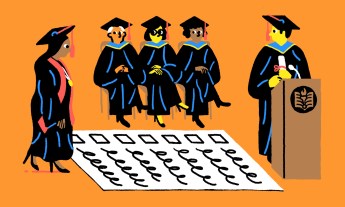What’s the future of education? It’s a popular question right now, with answers ranging from online learning to charter schools. But Liz Coleman is focused on a more fundamental issue: what will schools teach? And what does that mean for the future of our society?
In her eye-opening talk at TED2009, Coleman shared her hopes and fears for the future of the American liberal arts education. Then the president of Bennington College, she critiqued the status quo in higher education: a university system more concerned with growing endowments than with training the next generation of public servants. Universities, she said, are not producing students equipped to address pressing global issues. She called for a radical reimagining of the liberal arts education, and shared her vision for a school system that produces engaged citizens with a strong sense of civic duty.
In 2011, Coleman set out to make this a reality. She launched the Center for the Advancement of Public Action at Bennington, and has since left her post as president to head the organization full time. CAPA puts action and civic engagement at the center of its curriculum. The courses focus not on answers but on how to think critically and solve complex, real-world problems.
We caught up with Coleman to ask her about her new project — and what she hopes is next for education. Below, an edited transcript of that conversation.
Since speaking at TED, you’ve founded CAPA. What inspired you to start this program?
CAPA grew out of my concern for what’s happening in the world. This country is facing enormous challenges and it has a huge responsibility because of its position in the world. What happens in America affects everyone everywhere else as well. I confronted the enormity of these challenges when I was president of Bennington, and I knew we had to do something about it — and that was change the way we teach. Education plays a uniquely critical role in addressing the challenges we face.
The gap between public and private interest is devastating. Public interest has disappeared entirely from the academy. Universities are virtually silent on what we owe society beyond the narrowest versions of self-interest — there’s a huge gap between an education that expands opportunities and obligations to the larger community and what we’re seeing now. We wait for the experts and sit back and think, “There’s nothing I can do.” Schools need to teach public action, and the possibilities and obligations of every citizen. We need more energetic voices in the public arena.
What we’ve really lost sight of is an education system that teaches how to ethically, effectively and intelligently engage with the world. This is not a matter of sentiment or enthusiasm, but how to really engage with challenges. It requires the most demanding development of your resources as a human being — the resources that enable you to think, to see, to listen. Universities should teach students how to deal with a world in constant motion, a world that doesn’t come labeled and arranged for you, a world in which you have to work with a lot of other people both because you need their help and because they need to understand why you think what you’re doing makes sense. We’ve lost sight of this, but we can reclaim it through education.
We’re already doing this to some extent — what we call service and public action. But it’s all extra curricular, which sends a specific message: As long as you’re young and enthusiastic, be engaged, but when it comes to where you really put your values and classroom time, public action isn’t it.
How does CAPA bridge this gap between education and the public good?
CAPA’s greatest challenge is how to build a curriculum with courses that respond to what’s happening in the world. We let global challenges shape the curriculum, and we ask what will it take to do something effective in the world.
I’m currently teaching a course on the fundamentals of advancing public action. We started with global warming, and we worked through a combination of the deepest, classic texts on the topic to what’s happening right now. We’re exploiting those opportunities to respond to issues in real-time. Then we went to health, right in the middle of the debate on universal healthcare in the US. This was the world reminding us of its importance.
Action is the most important thing of all. Everything in CAPA — everything — is driven by the question: how is this changing your capacity to engage the world effectively? If you can’t answer that question, it’s not a CAPA course.
CAPA has ignited a culture shift across Bennington’s campus. There are courses teaching action — courses where you can see something’s going on here. Workshops on things like cities. We keep looking for seminal issues — places to work — where if you can work there, you’re going to really have a way of seeing what matters.
What makes the CAPA classroom experience different?
In the traditional classroom, professors organize things before teaching them. But the truth is, the world cannot be organized. To let the world in, you have to let in a world where nobody has the answers. CAPA operates under a pedagogy of discovery, not a pedagogy of consumption. You have to find out what you don’t know. The only difference between the faculty and students is that the faculty know how to be students. We’re not the ones who know the answers, but we’re the ones who know how to find out.
More and more and more students are experiencing their relationship to the world differently through CAPA. They’re facing the challenges of what that means and they’re increasingly interested in that being a critical part of their own education.
Part of the challenge is to confront every major area head-on, simultaneously. In any serious form of citizenship, your obligations are boundless. You can’t say, “I’m sorry but I don’t get that. I don’t do war, I only do health.” Typically university studies become progressively narrow in focus. The whole idea is that you can’t do anything serious unless you’re narrow. That’s the assumption, but it carries with it a learned helplessness.
It sounds like you’re calling for a more interdisciplinary education.
What I’m saying is that disciplines don’t ring. We have to see the world through issues and action. Interdisciplinarity is still seeing the world through disciplines — they maintain their authority. To have six narrow perspectives isn’t necessarily better than one. You have to be much more radical than that. Don’t think of people in disciplines — think of their capacities and how they transform. Until we break away from the constraints and disciplines composed of the full force of intellectual rigor, we’re in trouble.
It’s really a challenge that the disciplines are the only way of really working and that’s much more radical than interdisciplinarity presumes. It doesn’t help if you’re a historian looking at a question sitting next to a psychologist sitting next to a physicist. Just look at the issue for a second.
That is not to say that people don’t become fascinated by certain things that are equivalent to disciplines and they want to immerse themselves in it. That’s wonderful. But when disciplines run everything, that’s not wonderful.
Why do you think public action education has shifted to the back burner?
I think that what I see is increasing avoidance of complexity, which is a problem because the world is complex. I think there’s a fundamentalism about technology. Technology itself isn’t going to save us. Technology is wonderful, but it’s a tool.
There are a million things going on that are all signs that the people who are the most educated and capable of enlightened action are stunningly unengaged. Meanwhile, there are a lot of people who are very engaged. Passionately engaged. They’re the rabid and the fanatic and the fundamentalist. The people who are on the sidelines are the people who should be in the thick of it. We’ve lost the muscle among the people who are best positioned to be effective. We’ve ceded to the fundamentalists the whole area of values. Public action is all about values — you can’t escape it. It’s about what you care about, and why should other people care about it. That area has been shortchanged enormously by the intellectual establishment. So people go where they can find them, and unfortunately the only game in town is a fundamentalism.
How would you suggest people who aren’t enrolled in a college or university embrace public action?
There’s a wonderful line: “Don’t just do something, stand there.” That’s the essence of CAPA. If you really want to be effective, you have to stand there and take it in and learn and figure out and bring the resources that you bring to other things. You need to do it with other people — don’t try to do it alone.
You can’t settle for drops in the bucket. It won’t do to wrap up your garbage, it won’t do to send the contribution. Those are all fine, but it’s not going to make a huge change. It’s just not. It’s going to take all you’ve got. Really understand that. The stakes are very high and it’s very exciting and exhilarating.
We can also think about adult education as a place to create an activist citizenry. There are schools all over this country and they usually don’t have things going on at night. How can we organize a way for adults to talk to each other about things of common concern? We’re very good at having people talk to each other about things that matter — when we do it. That would be a more systemic approach — not just the university, but how we can use education and the classroom across the board to improve society.











